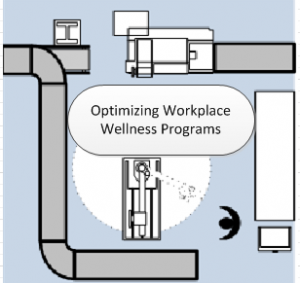Wellness Programs Need Cognitive Designers
Tuesday, November 27th, 2012 Wellness programs are a key application area for cognitive designers. These programs seek to shift employee health behaviors in an attempt to lower employer costs and improve workplace productivity. Wellness is big business as over 90% of larger employers have some plan in place and there are many provisions in the Affordable Care Act (aka Obamacare) that focus on health, wellness and prevention in the workplace. So I am always on the look out for scientific studies of what works in wellness.
Wellness programs are a key application area for cognitive designers. These programs seek to shift employee health behaviors in an attempt to lower employer costs and improve workplace productivity. Wellness is big business as over 90% of larger employers have some plan in place and there are many provisions in the Affordable Care Act (aka Obamacare) that focus on health, wellness and prevention in the workplace. So I am always on the look out for scientific studies of what works in wellness.
For example, Rand just released a must-read report that provides a Review of the US Workplace Wellness Market. They examine 33 studies and outline core elements in a program, itemize interventions used, provide uptake and participation statistics and draw some important conclusions. It is clear that wellness programs have passed the “proof of concept” phase but we don’t have a clear evidence base for interventions that work. The key conclusion on impact:
“Based on the available literature, we find evidence for a positive impact of workplace wellness programs on diet, exercise, smoking, alcohol use, physiologic markers, and health care costs, but limited evidence for effects on absenteeism and mental health. We could not conclusively determine whether and to what degree the intensity of a wellness program influences its impact.”
The report is quick to point out most wellness programs are not even assessed and those that are often lack rigor in assessment. From a cognitive design standpoint we know that without frequent assessment and feedback at the individual level it is nearly impossible to do the learning from experience necessary for lasting behavior change. And this must go far beyond the individual health risk assessments wellness programs use. Same for the program level. Without frequent assessment and feedback at the program level it is not possible to do the continuous improvement and organizational learning needed to optimize a wellness initiative.
More bluntly, you won’t get deep, broad and lasting behavior change at the individual and group level unless your wellness program is designed to measure and provide frequent feedback on physiological, activity, process, participation and financial measures. The more transparent (shared) and real-time the better.
There are big opportunity for cognitive designers in wellness!